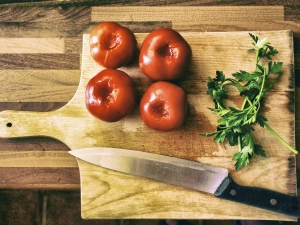Indo-Mediterranean Diet
The traditional Indo-Mediterranean Diet is a rich source of macro- and micro-nutrients because it emphasizes on daily consumption of vegetables, fruits, unrefined cereals, yogurt, cheese, nuts, olives and wine; bi-weekly consumption of legumes and fish; and monthly consumption of meat products.
Other versions include biweekly consumption of spices, herbs, and wild greens gathered from the countryside.
Fats make an important component of the traditional Indo-Mediterranean diet and account for almost 1/3 of total calories. Due to inclusion of plant foods, the traditional Indo-Mediterranean diet is a rich source of protein, phytochemicals and some vitamins and minerals. An estimate of the carbohydrate and protein composition of a typical Indo-Mediterranean diet is 47% and 15% respectively.
 Certain classes of phytochemicals such as flavonoids, carotenoids and anthocyanins in vegetables and fruits have been shown to improve cardiovascular health, reduce cancer risk, and lower cholesterol levels. A large proportion of total fat in Indo-Mediterranean diet is from mono-saturated fat which is largely responsible for maintaining the health of heart because it does not increase cholesterol levels the way trans fats do.
Certain classes of phytochemicals such as flavonoids, carotenoids and anthocyanins in vegetables and fruits have been shown to improve cardiovascular health, reduce cancer risk, and lower cholesterol levels. A large proportion of total fat in Indo-Mediterranean diet is from mono-saturated fat which is largely responsible for maintaining the health of heart because it does not increase cholesterol levels the way trans fats do.
However, Indo-Mediterranean diet does not state exact serving amounts per day, but rather lists total nutrition distribution with words such as “low to moderate intake” which may be confusing for people. Moreover, moderate consumption of wine may not be advisable for people taking certain medications.




